Who is in, and about to get in, the GOP race for President
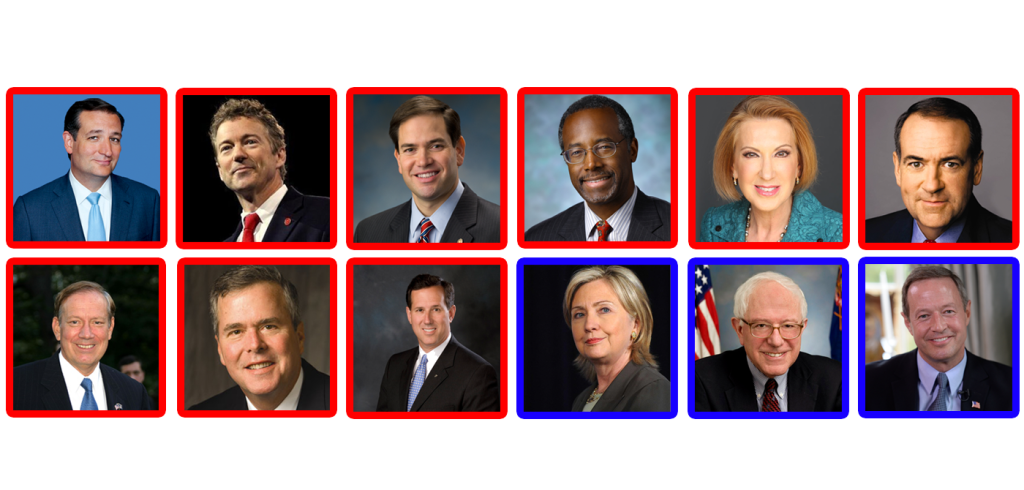
South Carolina Sen. Lindsey Graham is the ninth major Republican to enter the party’s 2016 presidential primary contest. Another half dozen or so are likely to get into the race later this summer, including former Texas Gov. Rick Perry later this week. Here’s a look at the GOP field: Who’s in, who’s almost in, and who’s still waiting for the right moment. IN THE RACE: Ted Cruz The first major Republican to get into the race, the Texas senator began his campaign March 23 at Liberty University in Lynchburg, Va. “I believe in you. I believe in the power of millions of courageous conservatives rising up to re-ignite the promise of America,” he said. Rand Paul The Kentucky senator launched his campaign April 7 in Louisville, where he told a hotel ballroom full of supporters, “I have a message, a message that is loud and clear and does not mince words: We have come to take our country back.” Marco Rubio In a speech April 13 in Miami, the senator from Florida called his candidacy for president a way for the country to break free of ideas “stuck in the 20th century.” He said, “This election is not just about what laws we are going to pass. It is a generational choice about what kind of country we will be.” Carly Fiorina The former tech executive chose social media and a nationally broadcast morning TV network show to launch her campaign on May 4, and she quickly went after Democratic front-runner Hillary Rodham Clinton. “I have a lot of admiration for Hillary Clinton, but she clearly is not trustworthy,” she said. Ben Carson The retired pediatric neurosurgeon got into the race the same day as Fiorina with an announcement speech in his native Detroit. “It’s time for people to rise up and take the government back. The political class won’t like me saying things like that. The political class comes from both parties.” Mike Huckabee The former Arkansas governor and runner-up in the 2008 GOP presidential primaries kicked off his second White House campaign May 5 in the hometown he shares with former President Bill Clinton — Hope, Ark. “Power, money and political influence have left a lot of Americans behind,” he said. Rick Santorum The runner-up to Mitt Romney in 2012, Santorum began his return engagement to presidential politics May 27 in his western Pennsylvania hometown of Cabot. “The last race, we changed the debate. This race, with your help and God’s grace, we can change this nation,” he said. George Pataki A former three-term governor of New York, who previously considered presidential campaigns in 2008 and 2012, Pataki got his campaign started on May 28 in Exeter, N.H. “While I saw the horrors of Sept. 11 first hand, in the days, weeks and months that followed, I also saw the strength of America on display. … I completely reject the idea that we can only come together in adversity.” Lindsay Graham After all but confirming the week before that he was in, the senior senator from South Carolina made it official Monday with a speech in his hometown of Central, S.C., that cast the foreign threats to America in dark terms. “Simply put, radical Islam is running wild. They have more safe havens, more money, more weapons and more capability to strike our homeland than any time since 9/11. They are large, they are rich, and they’re entrenched.” ALMOST THERE: Bobby Jindal The governor of Louisiana took his latest step toward running for president on May 18, announcing a campaign exploratory committee. “Economic collapse is much closer to the door than people realize, our culture is decaying at a rapid rate and our standing in a dangerous world is at an all-time low.” Rick Perry The former Texas governor is expected to announce his 2016 presidential bid on Thursday at an airfield outside Dallas, surrounded by prominent veterans — including the widow of Chris Kyle of “American Sniper” fame. WAITING FOR THEIR MOMENT: Jeb Bush The former Florida governor created a political action committee and super PAC in December and has been raising many millions for the groups expected to support his likely candidacy. Bush has begun visiting early-voting states, has a foreign policy trip to Europe planned for June and is expected to announce his plans shortly after returning. Chris Christie He says he hasn’t decided whether he’s running yet, but the New Jersey governor looks an awful lot like a candidate, making frequent trips to early-voting states, delivering a series of policy speeches and raising money for a political action committee and super PAC created by his backers. John Kasich The former congressman and current Ohio governor is hinting to donors and voters he’s likely to get into the race. His political organization, New Day for America, announced Monday his plans to travel to Iowa later this month. Donald Trump The real estate mogul and reality television star has launched a presidential exploratory committee and is still debating on whether to get into the race. Never short of self-confidence, he said last month he’d be a force to reckon with in the GOP debates. “Selfishly, the networks would put me on because I get great ratings,” Trump said. Scott Walker The Wisconsin governor says he will announce his decision after signing the state budget, which is expected to pass the Republican-controlled state Legislature in late June. Walker has already created a nonprofit group, Our American Revival, to help promote his expected candidacy, and a super PAC led by his close advisers is also up and running. Republished with permission of The Associated Press.
2016 hopefuls parade on the Sunday morning shows
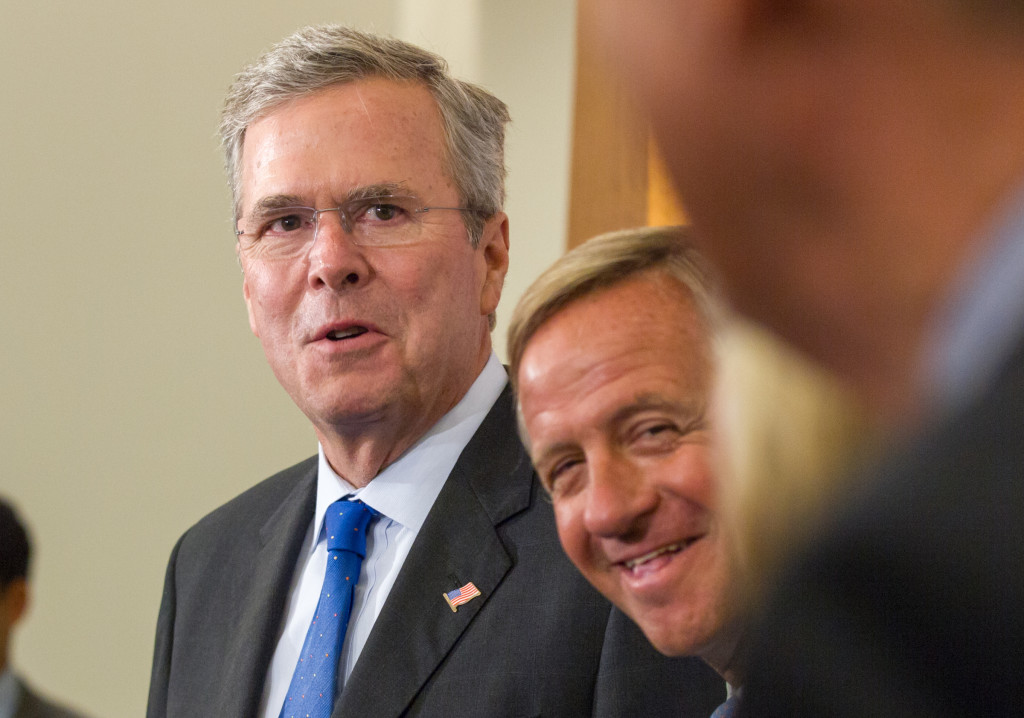
Bernie Sanders is itching to debate and not just with other Democrats running for the party’s presidential nomination. He says Democratic and Republican contenders should be debating each other during the primary season, too. That shakeup is unlikely to happen: Each party is planning its own debates, as usual. But the network news shows Sunday morning were something of a debating society of their own as 10 declared and likely candidates from both parties appeared in a parade of political argument and sound bites, touching on ISIS, personal ambition, immigration, hair color and more. A sampling: Bush on the big question Is some extraterrestrial force keeping Jeb Bush from announcing a presidential candidacy? Pressed on CBS’ Face the Nation, he spoke as if the decision is not his own. “I hope I run,” he said. “I hope, I hope, I’m a candidate in the near future.” What might possibly persuade him not to run? “Who knows?” Bush replied. “I’ve learned not to answer a lot of hypothetical questions.” The former Florida governor said he’ll decide soon after his trip to Europe, which starts in a week. Bush has been campaigning and fundraising for months and the political world would be shocked if he did not enter the Republican nomination race. There are various reasons politicians dance around the question of whether they’re running. One big reason: Once they declare their candidacy, they can no longer work directly with super PACs that are raising money to help them. Bush says he’s already checked with his wife and children they are “totally all in.” That’s if he runs. As he hopes. Why O’Malley? Hillary Rodham Clinton is in the most commanding position by far in the Democratic race. Sanders, a self-described democratic socialist, stepped up in April to take her on and court the party’s left. So what does Martin O’Malley, who entered the contest Saturday, have to offer liberals that Sanders doesn’t? Achievement, he told ABC’s “This Week.” “I have a track record of actually getting things done, not just talking about things,” O’Malley said when asked to compare himself with Sanders, an independent in the Senate who aligns with Democrats. O’Malley served as Maryland governor and Baltimore mayor. Still steamed Presidential candidate Sen. Rand Paul certainly raised hackles in his own party when he blamed the rise of the Islamic State group on Republican hawks, and perhaps none has taken more offense than Louisiana Gov. Bobby Jindal. Jindal was asked Sunday on ABC whether he would support Paul if the Kentucky senator became the Republican nominee. “I don’t think he will be our party’s nominee,” Jindal said. Jindal is expected to say in coming weeks whether he will join the nomination contest. Paul said last week that Republican hawks supported the indiscriminate spread of arms in the region where ISIS operates and some of those weapons have fallen into the hands of extremists. That led Jindal to say Paul is unsuited to be president. The governor says ISIS exists purely because of radical Islam. Bring on the debates “We need a lot more debates in this campaign,” Sanders said on NBC’s Meet the Press. The Vermont senator said the Democratic debates should begin as soon as July and, in a twist, some Republicans should be in the mix. That’s not the plan. The Democratic Party says it will hold six presidential primary debates with its candidates, beginning in the fall. The first Republican debate will be in August, drawn from a much larger field of rivals. Concerning hair Carly Fiorina says she colors her hair, like Clinton does. Fiorina, the former Hewlett-Packard CEO now running for the Republican nomination, told Fox News Sunday she’s just happy to have hair. She lost it for a while when she was battling breast cancer. Clinton told an audience in South Carolina last week that while at age 67 she may not be the youngest candidate in the race, she did have one advantage: “I’ve been coloring my hair for years.” She said most presidents go snow white in office. Republished with permission of The Associated Press.
Rick Santorum launches 2nd GOP presidential bid
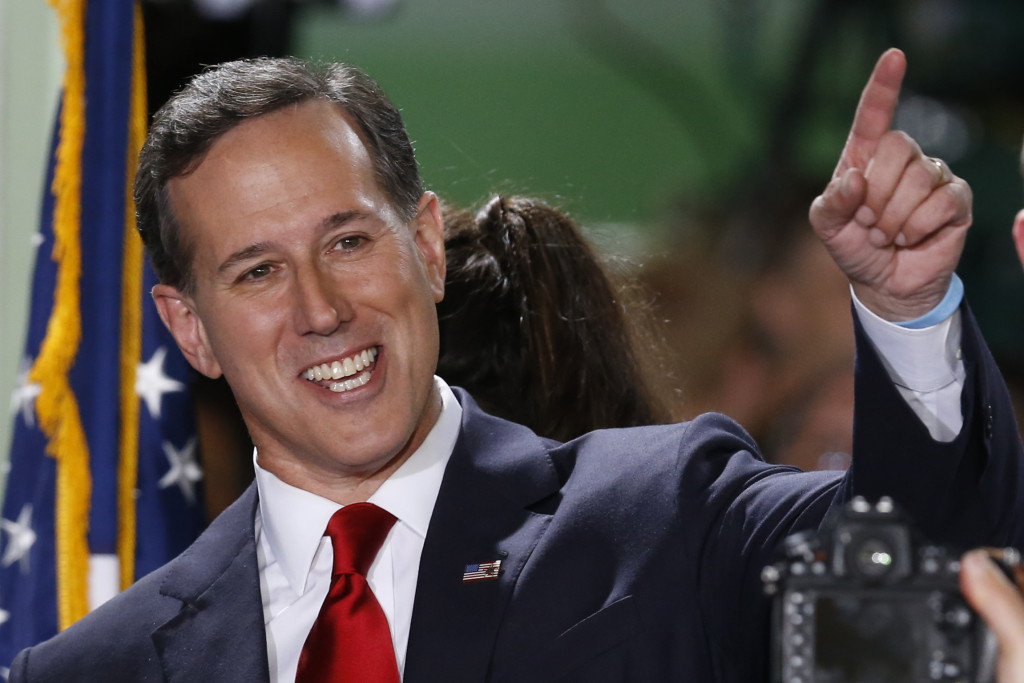
Rick Santorum, an aggressive advocate for conservative family values, launched a second bid for president on Wednesday, a spokesman said. The former Pennsylvania senator exceeded the political world’s expectations by scoring a second-place finish in the race for the Republican presidential nomination four years ago. Yet as he competes again, he may struggle even to qualify for the debate stage in 2016. The 57-year-old Republican delivered his announcement at a factory near his western Pennsylvania hometown. Santorum was surrounded by factory workers at the event, a carefully scripted setting designed to showcase his focus on the working class. A major player in 2012, he opens this political season almost as a heavy underdog in a race expected to feature more than a dozen high-profile Republicans — most of them newcomers to presidential politics. Santorum says his experience could pay dividends the second time around. Most of the GOP’s recent presidential nominees, Mitt Romney and President Ronald Reagan among them, needed more than one campaign to win the nomination. “This is a long process,” Santorum told reporters recently. “One of the things that I feel very comfortable with — I’ve been through this process before.” He said it’s a “completely wide open race.” The prospective Republican field already includes four sitting senators, four governors, four former governors, two business leaders and a retired neurosurgeon. Santorum won 11 states in the last presidential primary contest, yet his early longshot status may keep him out of presidential debates altogether. Only those who place in the top 10 of national polls will be allowed to participate in the first Republican presidential debate in August, according to guidelines released by network host Fox News. Santorum and fellow 2012 candidate, former Texas Gov. Rick Perry, are among those on the bubble. Much of Santorum’s past success was tied to his performance in Iowa, where he scored a narrow victory over Romney in the nation’s first presidential nominating contest. Facing little competition for the state’s influential evangelical vote, Santorum impressed voters by touring Iowa’s 99 counties in a pickup truck. Iowa will continue to be a focus in 2016, according to spokesman Matt Beynon, who said Santorum’s rollout tour would begin in Iowa on Thursday and Friday and move to South Carolina on Saturday and Sunday. His road to relevancy this time won’t be easy, however. “It’s going to be much more competitive,” said Foster Friess, a prominent Santorum donor. Santorum faces considerable competition for his party’s social conservatives. The list of candidates already courting religious voters includes former Arkansas Gov. Mike Huckabee, a Baptist pastor who won the Iowa caucuses in 2008, Perry, Louisiana Gov. Bobby Jindal and Texas Sen. Ted Cruz. And like Santorum, former Florida Gov. Jeb Bush is a Catholic. Questions remain about Santorum’s ability to raise money as well. Expressing confidence, Beynon said Santorum would benefit from a donor network that has only grown in the years since his first run. “He would anticipate having more money,” Beynon said. “That was certainly a factor in his decision.” And Friess, who previously gave more than $2 million to a pro-Santorum super PAC in 2012, said he would continue to support Santorum’s White House ambitions, although he plans to avoid donating large amounts directly to the campaign or a supportive super PAC, both of which would disclose their donors. “Any giving I’m doing is going to be lower-profile and less noticed,” Friess told The Associated Press. On the ground in early-voting states like Iowa and South Carolina, Santorum starts off as well-known among voters and activists. But a new crop of Republican competitors like Wisconsin Gov. Scott Walker has been aggressively touring the states in recent weeks as well. And some voters prefer a fresh face in an election season expected to feature Hillary Rodham Clinton on the Democratic side. “The electorate is so unpredictable, I wouldn’t make a betting guess for him or against him,” Iowa National Republican committeeman Steve Scheffler said of Santorum. “But he’s got a lot of work to do — like the others.” Republished with permission of The Associated Press.
10’s a crowd? GOP prepares for double digits on debate stage
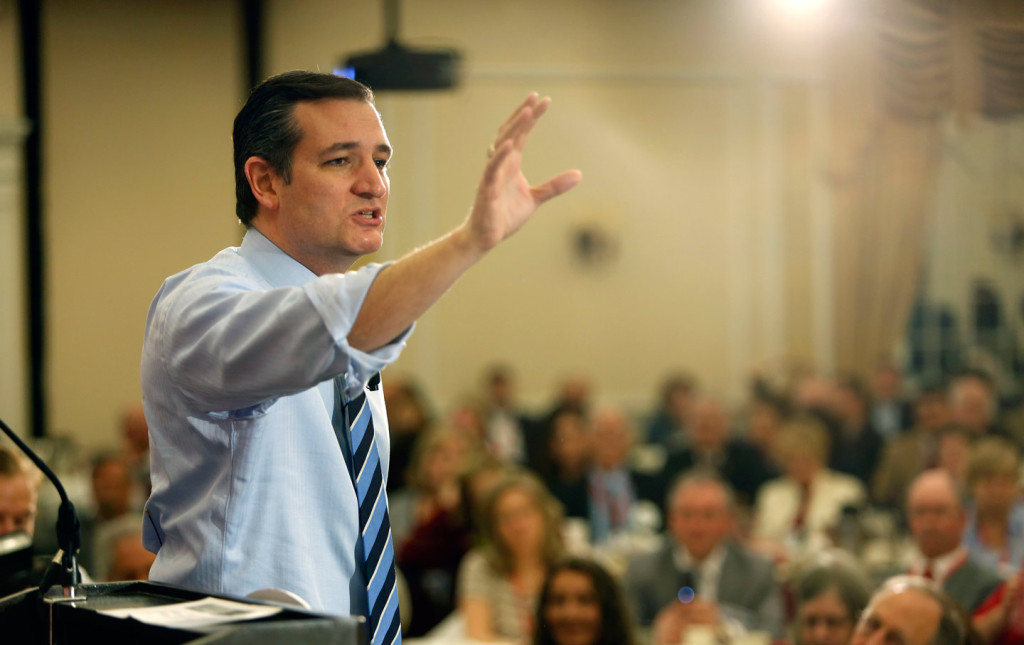
The first Republican presidential debate will feature no fewer than 10 candidates. That’s according to guidelines released Wednesday by debate hosts Fox News and Facebook, which offer the first clues as to how the GOP will handle its largest presidential class in recent memory. Party officials have been working privately in recent weeks to prevent its first debate in August from becoming a nationally televised circus, while lesser-known candidates have been lobbying for access. Only announced candidates will be allowed to participate, according to the new guidelines. Participation will be limited to those who “place in the top 10 of an average of the five most recent national polls, as recognized by Fox News.” More than 10 candidates would be allowed on the debate stage in the event of a tie. At least 15 high-profile contenders are expected to compete for a spot, a group likely to include eight current or former governors, four senators, two accomplished business executives and a renowned neurosurgeon. There will be winners and losers under the new system. The winners could include the likes of Donald Trump, a businessman and reality television star who has already launched a presidential exploratory committee. While some party officials were reluctant to grant him a spot on stage should he run, he has placed within the top 10 in most recent polls. The losers could include statewide office holders who have struggled to gain national traction. Those on the bubble include former Texas Gov. Rick Perry, Louisiana Gov. Bobby Jindal, 2012 presidential candidate Rick Santorum, Ohio Gov. John Kasich, and former technology executive Carly Fiorina, the only woman in the Republican field. Their roads to the White House would be even steeper without the opportunity to stand out in a nationally televised debate. “I’ll look forward to making the cut and making my case to GOP voters on Aug. 6,” Fiorina wrote on Twitter. Several candidates have lobbied Republican officials in recent weeks to consider creative options, including debate “heats” featuring seven or eight candidates at a time on consecutive nights. CNN, which plans to hold a GOP debate in September, said Wednesday it will divide its event into two parts: one featuring the 10 highest-polling candidates, the other including “candidates who meet the minimum threshold of 1 percent in public polling but are ranked outside the top 10.” Republican National Committee Chairman Reince Priebus said, “We support and respect the decision CNN has made.” For its August debate, Fox News also promised to provide “additional coverage and air time … to those candidates who do not place in the top 10,” according to Michael Clemente, the network’s executive vice president of news editorial. There will be 12 GOP presidential debates between August and March, with the first scheduled for Aug. 6 in Cleveland. The moderators for the first meeting include Fox anchors Bret Baier, Megyn Kelly and Chris Wallace. Republished with permission of The Associated Press.
Rick Perry to say June 4 if he’ll run again for President
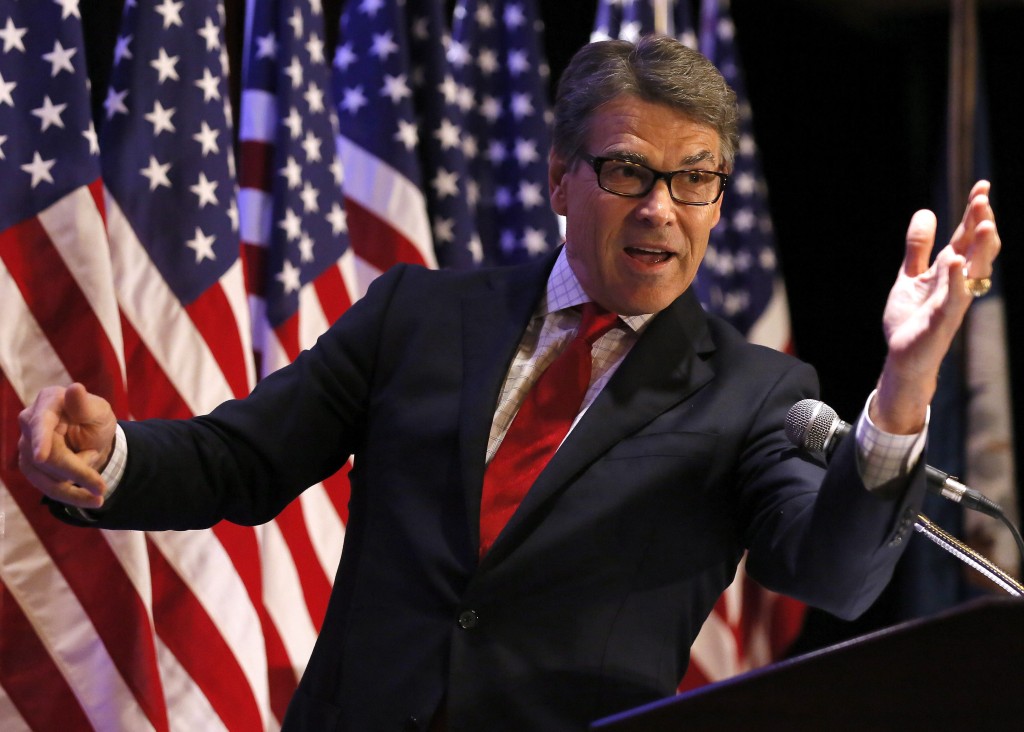
Former Texas Gov. Rick Perry will say whether he is running for president at an announcement next month in Dallas. The longest-serving governor in Texas history has spent months traveling in the early voting states of Iowa, New Hampshire and South Carolina as he gears up for a second White House bid. Perry’s wife, Anita, tweeted the first word of Perry’s plan for an announcement and then emailed supporters about it. “America is facing a time of testing, and it’s clear that we need principled leadership and an optimistic vision to see us through after eight years of the Obama Administration,” she wrote. A spokesman said Friday Perry is not ready to declare his candidacy. “He’s announcing his intentions on June 4,” Perry spokesman Travis Considine said in Washington, where he was traveling with Perry. “He has not said what he’ll be announcing. You’ll have to stay tuned.” Asked if he knew whether Perry had made up his mind, senior adviser Jeff Miller said, “I do know that,” but refused to give any details. When Perry got into the 2012 presidential race, he announced his campaign in South Carolina. He entered as a potential front-runner but flamed out after a series of blunders, including an infamous “oops” moment when Perry couldn’t remember, during a GOP debate, the name of the third Cabinet agency he wanted to eliminate. Perry left office in January and is facing a criminal abuse-of-power indictment in Austin for threatening in 2012 to veto state funding for public corruption prosecutors and then doing so. Besides maintaining his travel schedule, Perry has been studying with policy experts in an effort to make a stronger impression than he did in his first presidential run. Republished with permission of the Associated Press.
GOP wrestling with too many ’16 prospects for a TV debate
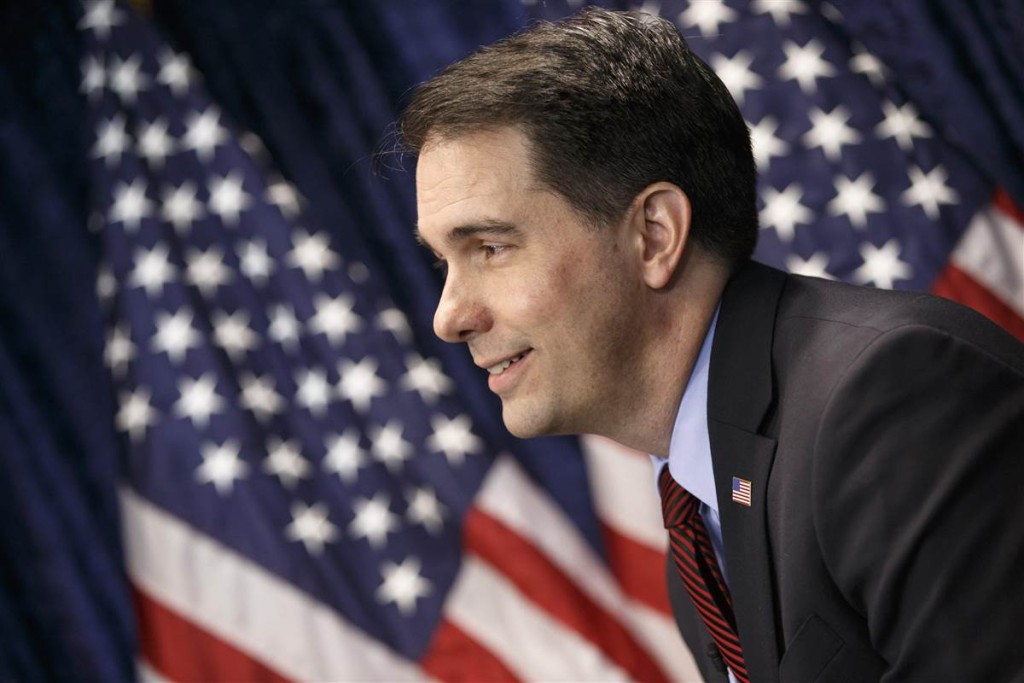
Never have more than 10 candidates taken the stage for a televised Republican presidential debate. Wish the GOP luck in trying to keep it that way. With the party’s first debate set for August, Republicans must decide to either allow what could become a nationally televised circus act, or figure out how to fairly whittle down a field likely to include eight current or former governors, four senators, two accomplished business executives and a renowned neurosurgeon. More than a half-dozen contenders have already begun to lobby party officials for access in a debate season that could be unlike any other. The GOP has an advantage in drawing “one of the most diverse, broad” fields it’s ever had, said Saul Anuzis, a former Republican National Committee member from Michigan. “But what if by the first debate we still have 10 to 15 viable candidates? That’s going to be a zoo.” Part of the problem is basic math. In a 90-minute debate featuring so many candidates, there would be only enough time for opening and closing statements and two, maybe three questions — with no time left over for the interaction between candidates that makes for an actual debate. Thus, a process filled with opportunity as the GOP seeks to highlight its diverse crop of candidates, but also fraught with risk as some of the traditional ways of making the cut could exclude some who have won statewide office, not to mention the only woman and African-American in the field. “This is the political equivalent of breaking an atom open,” said Republican National Committee strategist Sean Spicer. Worried they might be left out, several candidates are encouraging the RNC to consider creative options, including debate “heats.” Brad Todd, an adviser to the super PAC backing Louisiana Gov. Bobby Jindal, is pushing RNC Chairman Reince Priebus to hold two 90-minute debates on consecutive nights featuring different groups of candidates. Rick Santorum, the runner-up in the 2012 Republican primary contest, floated the same idea as he visited with RNC officials in Arizona this week. “I am concerned about potentially a large field and any attempt to try to squeeze that field down to the preferred group,” Santorum said. “If you drew straws to the two different debates, I guarantee you you’d have good people in both debates that would draw audiences.” Others are privately pressing party leaders to allow for the broadest participation possible in the first debate, set for this August in Cleveland. Businessman and TV personality Donald Trump is among those whose advisers have spoken directly with Priebus in recent days. “Selfishly, the networks would put me on because I get great ratings,” said Trump, who has launched a presidential exploratory committee. “We spoke to Reince today and they want me on.” Yet Trump’s place on the debate stage is by no means assured. There is broad agreement that participants must be announced candidates and reach an undetermined threshold in national polling, with final criteria to be approved by the television networks partnering with the party to host 12 debates between August and March. There are currently eight contenders who poll consistently at or above 5 percent: Former Florida Gov. Jeb Bush, Wisconsin Gov. Scott Walker, former Arkansas Gov. Mike Huckabee, Florida Sen. Marco Rubio, Kentucky Sen. Rand Paul, New Jersey Gov. Chris Christie, Texas Sen. Ted Cruz and retired neurosurgeon Ben Carson. While Trump typically polls close to 5 percent when included in surveys, there are several high-profile prospects who do not. Among them: former Pennsylvania Sen. Santorum, former Texas Gov. Rick Perry, Ohio Gov. John Kasich, South Carolina Sen. Lindsey Graham, Louisiana Gov. Bobby Jindal and former technology executive Carly Fiorina. Organizers are also considering factors such as campaign and super PAC fundraising, experience in office, polling in the early voting states and the desire to have as diverse a field on stage as possible. Spicer said Friday the RNC opposes any consideration of race or sex as criteria, but some party officials are particularly focused on elevating Fiorina, the only woman in the Republican field. The overwhelming front-runner on the Democratic side is Hillary Rodham Clinton. “Sex should not be one of the criteria that the committee uses, and I’m quite confident I’ll be on the debate stage,” Fiorina, who is drawing roughly 1 percent in national polls, told reporters this week during the RNC’s spring meeting in Phoenix. Kasich supporters, meanwhile, are incredulous that a two-term governor from a must-win swing state could be excluded. “If they don’t put him in the debate, there’s going to be some explaining to do,” said Ohio GOP chairman Matt Borges. Republished with permission of the Associated Press.
In South Carolina, a Republican scramble to stand-out
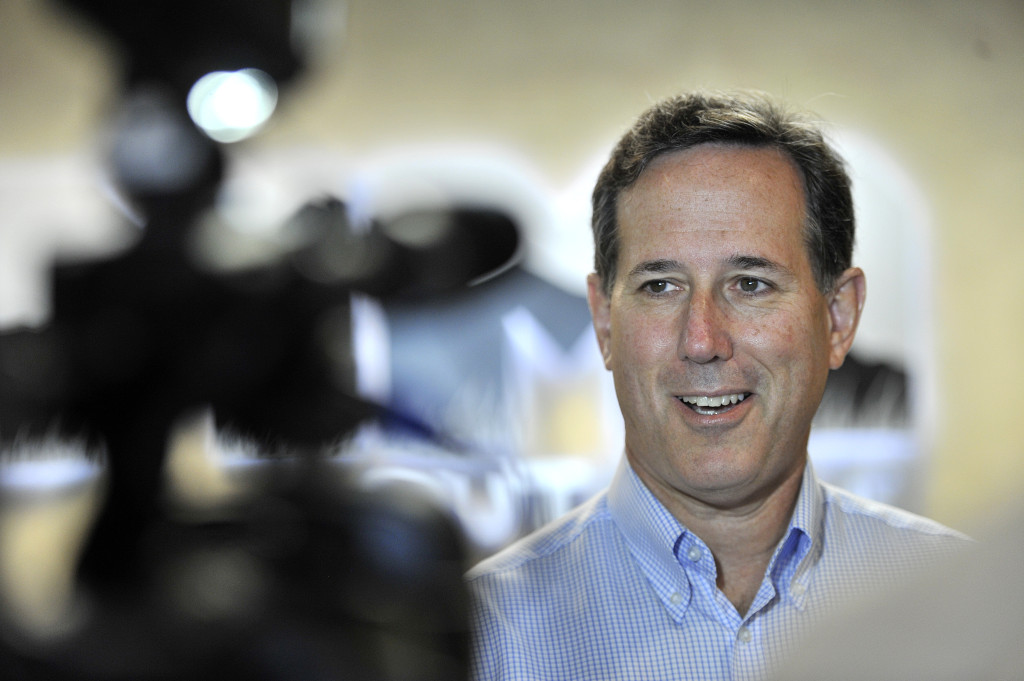
Republicans making their pitch to be the party’s 2016 presidential nominee aimed to out-do each other Saturday in arguing that President Barack Obama is a failed leader. But hitting Obama with the usual critiques – from his 2010 health care overhaul to allegations of missteps on foreign policy to the rise in the national debt during his time in office – also made it hard for the gaggle of White House aspirants to stand out during a forum in South Carolina hosted by the conservative group Citizens United. Wisconsin Gov. Scott Walker tried by touting his ability to beat whomever is nominated by the Democratic Party, reminding activists that he won three statewide elections in four years in a state twice carried by Obama. “The last time a Republican carried the state for president was 1984,” he said. “That’s a tough state.” He even took the crowd back to his decision to run for county executive in heavily Democratic Milwaukee County. “Never ever had there been a Republican in that spot before,” he said. Carly Fiorina, the former Hewlett-Packard CEO, continued her tactic of going straight at Hillary Rodham Clinton, the Democratic favorite for 2016. “She is not trustworthy, and she does not have a record of accomplishment,” Fiorina said. In an interview before his turn on stage, Louisiana Gov. Bobby Jindal pointed to his work on policy, saying he’s the only potential candidate in the field who has “spent the last 18 months coming up with detailed ideas on health care, on foreign policy, on energy.” Once on stage, Jindal spent considerable time touting his credentials as a social conservative, including his pushback against criticism from some in the business community over “religious liberty” laws that have become a flashpoint in the national debate over same-sex marriage. “Don’t even waste your breath trying to bully the governor of Louisiana,” Jindal said, repeating what he said was his message to corporate leaders. Rick Santorum, who won the Iowa caucuses in 2012 before fizzling out against eventual nominee Mitt Romney, warned that Republicans eager to retake the White House after Obama’s two terms in office must stay focused on reaching working-class voters. “We have to be a pro-worker party,” he said. “We have to be the party for a rising tide lifting all boats. There are millions and millions of Americans who have holes in those boats.” Florida Sen. Marco Rubio took a hard line on foreign policy, saying the nation must get tougher with terrorists. Adapting a line from the movie “Taken,” he said: “We will look for you. We will find you. And we will kill you.” Texas Sen. Ted Cruz trumpeted his unapologetic approach on Capitol Hill, where he helped engineer a partial government shutdown in 2013. And he told activists that they should compare his style with his rivals, all of whom insist they are conservative. “Have you had anyone up here today say, `I’m an establishment moderate who stands for nothing?’” he said. “So how do you tell the difference? The scriptures tell us, `You shall know them by their fruits.” That means, he said, asking candidates, “You say you believe these principles. When have you fought for them?” Former Texas Gov. Rick Perry let loose a series of broadsides at Obama and his policies, drawing cheers from the crowd for a withering critique that covered immigration, the Affordable Care Act, the Islamic State militant group and the federal budget. His bottom line: “We’ve seen gross incompetence. We’re here to declare that we’re not going to take it anymore.” Ben Carson, the retired neurosurgeon who, like Fiorina, announced his candidacy earlier this week, is running as the outsider. “I’m not a politician,” he said. “That’s what sets me apart.” Those not in South Carolina on Saturday included former Florida Gov. Jeb Bush, who delivered the commencement address at Liberty University in Virginia; Kentucky Sen. Rand Paul, who was campaigning in northern California; and former Arkansas Gov. Mike Huckabee, who was in South Carolina on Friday. Citizens United President David Bossie dismissed the idea that the large number of GOP candidates muddled their messages and called the wide field an advantage. “These men and women all believe in American exceptionalism,” Bossie said. He added that along with criticizing Obama, Republicans should focus their ire on Clinton – a point on which many in the crowd agreed. “Any one of them would be better than the disaster we’ve got now,” said Gary Gunderson of Abbeville, South Carolina. His wife, Margaret, chimed in: “Or Hillary.” Republished with permission of the Associated Press.
Jeb Bush: Stronger ‘Christian voice’ needed in world
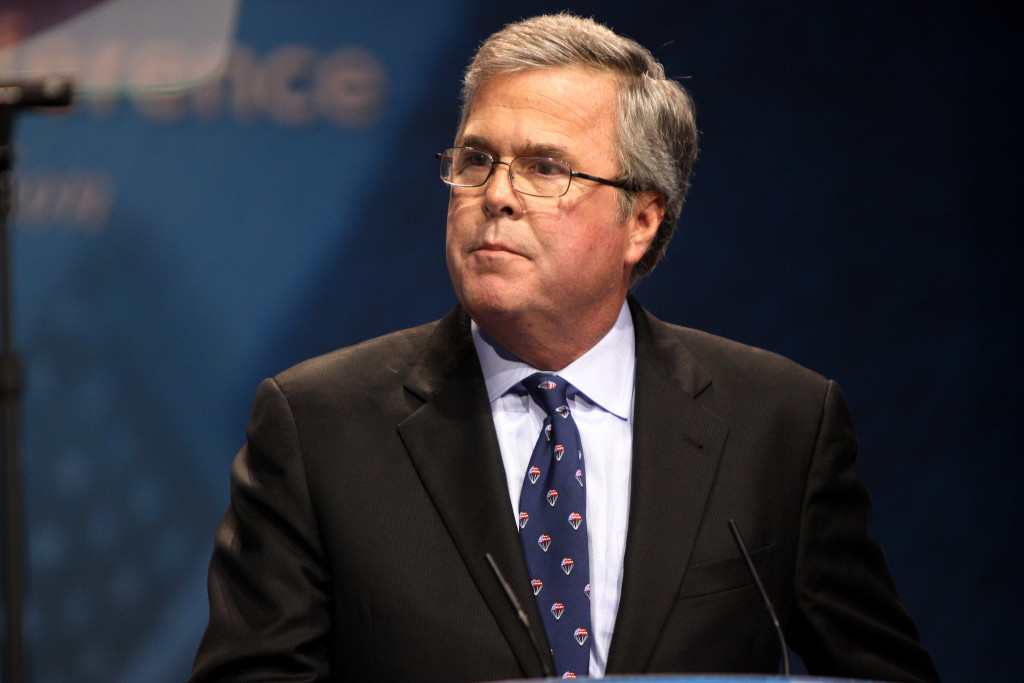
Former Florida Gov. Jeb Bush on Saturday condemned the Obama administration’s use of “coercive federal power” to limit religious freedom as he courted Christian conservatives at a Liberty University commencement ahead of a likely presidential run. Charging that “the Christian voice” isn’t heard enough in the world, the Republican White House prospect lashed out at the Democratic president’s administration for “demanding obedience in complete disregard of religious conscience.” “The present administration is supporting the use of coercive federal power. What should be easy calls in favor of religious freedom have instead become an aggressive stance against it,” Bush told an estimated 34,000 gathered for a graduation ceremony. “Somebody here is being small-minded and intolerant, and it sure isn’t the nuns, ministers, and laymen and women who ask only to live and practice their faith,” he said. Bush was speaking inside a packed football stadium at Liberty University, an institution founded by the late conservative culture warrior, Rev. Jerry Falwell. Bush, a converted Catholic, is preparing to enter a Republican primary contest that includes Republican competitors considered far more popular with the GOP’s religious right. Texas Sen. Ted Cruz formally announced his presidential campaign at Liberty University last month. Former Arkansas Gov. Mike Huckabee, a Baptist pastor, Louisiana Gov. Bobby Jindal and former Texas Gov. Rick Perry have all made their Christian faith a centerpiece of prospective campaigns. All have aggressively condemned Obama’s health care overhaul which requires some religion-affiliated organizations to provide health insurance for employees that includes birth control. The measure is among several examples of what Republicans charge is Obama’s attack on religious liberty. “How strange, in our own time, to hear Christianity spoken of as some sort of backward and oppressive force,” Bush said. “Your generation is bringing the Christian voice to where it always is needed, and sometimes isn’t heard enough.” Despite nagging questions about Bush’s conservative credentials, Liberty University president Jerry Falwell Jr. noted that Bush was considered a hero among social conservatives as Florida governor. He fought to keep Michael Schiavo from removing the feeding tube from his brain-damaged wife, Terri. Leaders in the anti-abortion movement still praise Bush today. And in a reminder that his path to the presidency depends upon moderate and independents perhaps as much as conservatives, Bush concluded his remarks with a message for non-Christians. “In my experience, at least, you generally find the same good instincts, fair-mindedness, and easygoing spirit among Americans of every type – including, of course, the many who belong to no church at all,” he said. Democrats were paying close attention to Bush’s remarks. “Jeb Bush will not win over any Virginia voters with his close-minded pandering to the right wing,” said Morgan Finkelstein, spokesman for the Democratic Party of Virginia. “By supporting the Indiana discrimination law and attacking women’s reproductive rights, Bush places himself firmly at odds with Virginia values.” Republished with permission of the Associated Press.
In South Carolina, a Republican scramble to stand out
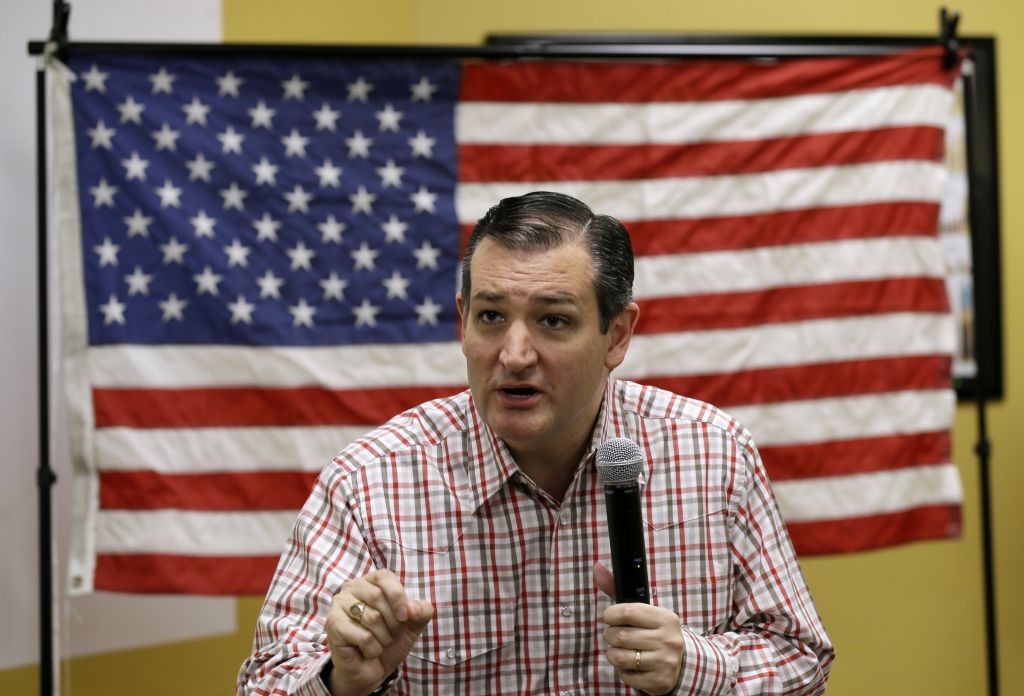
Republicans making their pitch to be the party’s 2016 presidential nominee aimed to out-do each other Saturday in arguing that President Barack Obama is a failed leader. But hitting Obama with the usual critiques — from his 2010 health care overhaul to allegations of missteps on foreign policy to the rise in the national debt during his time in office — also made it hard for the gaggle of White House aspirants to stand out during a forum in South Carolina hosted by the conservative group Citizens United. Wisconsin Gov. Scott Walker tried by touting his ability to beat whomever is nominated by the Democratic Party, reminding activists that he won three statewide elections in four years in a state twice carried by Obama. “The last time a Republican carried the state for president was 1984,” he said. “That’s a tough state.” He even took the crowd back to his decision to run for county executive in heavily Democratic Milwaukee County. “Never ever had there been a Republican in that spot before,” he said. Carly Fiorina, the former Hewlett-Packard CEO, continued her tactic of going straight at Hillary Rodham Clinton, the Democratic favorite for 2016. “She is not trustworthy, and she does not have a record of accomplishment,” Fiorina said. In an interview before his turn on stage, Louisiana Gov. Bobby Jindal pointed to his work on policy, saying he’s the only potential candidate in the field who has “spent the last 18 months coming up with detailed ideas on health care, on foreign policy, on energy.” Once on stage, Jindal spent considerable time touting his credentials as a social conservative, including his pushback against criticism from some in the business community over “religious liberty” laws that have become a flashpoint in the national debate over same-sex marriage. “Don’t even waste your breath trying to bully the governor of Louisiana,” Jindal said, repeating what he said was his message to corporate leaders. Rick Santorum, who won the Iowa caucuses in 2012 before fizzling out against eventual nominee Mitt Romney, warned that Republicans eager to retake the White House after Obama’s two terms in office must stay focused on reaching working-class voters. “We have to be a pro-worker party,” he said. “We have to be the party for a rising tide lifting all boats. There are millions and millions of Americans who have holes in those boats.” Florida Sen. Marco Rubio took a hard line on foreign policy, saying the nation must get tougher with terrorists. Adapting a line from the movie “Taken,” he said: “We will look for you. We will find you. And we will kill you.” Texas Sen. Ted Cruz trumpeted his unapologetic approach on Capitol Hill, where he helped engineer a partial government shutdown in 2013. And he told activists that they should compare his style with his rivals, all of whom insist they are conservative. “Have you had anyone up here today say, ‘I’m an establishment moderate who stands for nothing?’” he said. “So how do you tell the difference? The scriptures tell us, ‘You shall know them by their fruits.” That means, he said, asking candidates, “You say you believe these principles. When have you fought for them?” Former Texas Gov. Rick Perry let loose a series of broadsides at Obama and his policies, drawing cheers from the crowd for a withering critique that covered immigration, the Affordable Care Act, the Islamic State militant group and the federal budget. His bottom line: “We’ve seen gross incompetence. We’re here to declare that we’re not going to take it anymore.” Ben Carson, the retired neurosurgeon who, like Fiorina, announced his candidacy earlier this week, is running as the outsider. “I’m not a politician,” he said. “That’s what sets me apart.” Those not in South Carolina on Saturday included former Florida Gov. Jeb Bush, who delivered the commencement address at Liberty University in Virginia; Kentucky Sen. Rand Paul, who was campaigning in northern California; and former Arkansas Gov. Mike Huckabee, who was in South Carolina on Friday. Citizens United President David Bossie dismissed the idea that the large number of GOP candidates muddled their messages and called the wide field an advantage. “These men and women all believe in American exceptionalism,” Bossie said. He added that along with criticizing Obama, Republicans should focus their ire on Clinton — a point on which many in the crowd agreed. “Any one of them would be better than the disaster we’ve got now,” said Gary Gunderson of Abbeville, South Carolina. His wife, Margaret, chimed in: “Or Hillary.” Republished with permission of the Associated Press.
GOP 2016 hopefuls talk social issues in Iowa
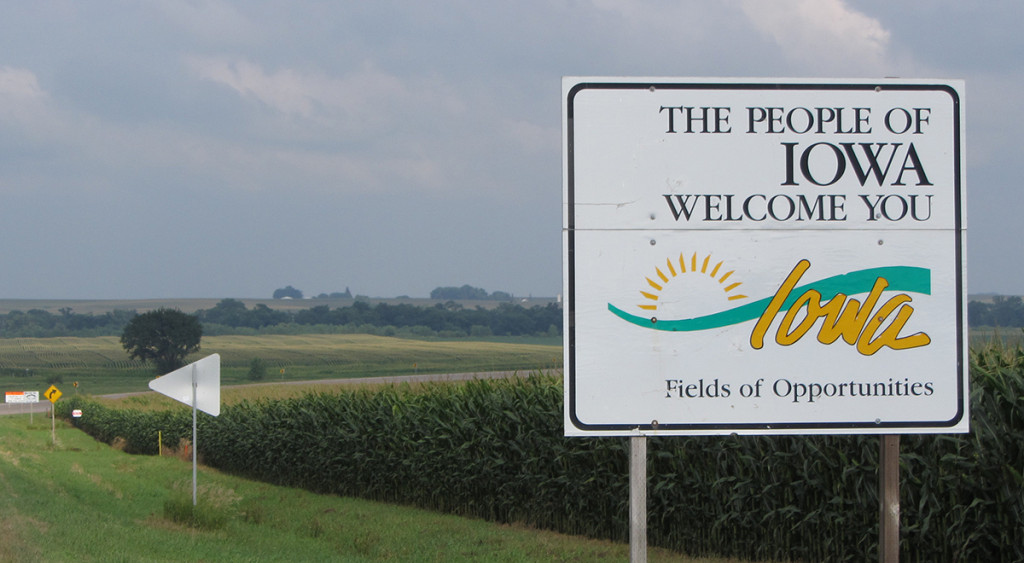
Republican presidential hopefuls emphasized their staunch opposition to gay marriage and abortion rights this weekend before a crowd of social conservatives who hold significant sway in the state’s leadoff presidential caucuses. Nine declared and prospective 2016 candidates appeared in a church in Waukee for a forum Saturday sponsored by the conservative Iowa Faith and Freedom Coalition and attended by more than 1,000 people. The forum gave candidates an opportunity to show off their conservative bona fides, with speeches on religious freedom and social issues that repeatedly brought the crowd to its feet. Texas Sen. Ted Cruz noted that the U.S. Supreme Court will hear oral arguments in four states’ same-sex marriage cases on Tuesday and said that between now and then, conservatives must “fall to our knees and pray.” “We need leaders who will stand unapologetically in defense of marriage and life,” Cruz said in remarks that drew huge applause. On abortion, Kentucky Sen. Rand Paul encouraged conservatives to be more aggressive in their opposition, saying: “I’m tired of us retreating on this issue and I’m going to push back.” He also argued that most Americans were uncomfortable with late-term procedures. Abortion has been a tricky issue for the senator. He has supported restrictions on the procedure in legislation yet said the issue is too divisive to expect changes in federal abortion law, a stance that raised earlier concerns among some religious conservatives about his commitment to their cause. The gathering offered a platform for Republican contenders to cater to social conservatives with a message that did not always address the full range of their views on social issues. Both Florida Sen. Marco Rubio and Paul, for example, have stopped short of calling for a federal ban on same-sex marriage sought by some religious conservatives. The senators have said that question should be left to the states. Many candidates spoke about their personal faith beliefs. Louisiana Gov. Bobby Jindal spoke about his conversion to Christianity and said he would seek to protect religious freedom. “The United States of America did not create religious liberty,” Jindal said. “Religious liberty created the United States of America.” Also on the program were former Texas Gov. Rick Perry, Wisconsin Gov. Scott Walker, former Arkansas Gov. Mike Huckabee, former Pennsylvania Sen. Rick Santorum and businesswoman Carly Fiorina. Most candidates focused on religious and social issues, but several took shots at Democratic front-runner Hillary Rodham Clinton. Fiorina, the only woman among the 2016 Republican contenders, said Republicans need to choose someone who can throw “punches all day long” at the potential Democratic presidential nominee. Gary Chidester, 65, of Lakesburg, said he had talked to most candidates even before the event, but remained undecided. He was most interested in hearing support for traditional marriage and opposition to abortion rights, adding: “As a Christian, when I’m holding my Bible and the words change in it, I’ll change.”
Unpopular at home, Bobby Jindal getting little traction for 2016
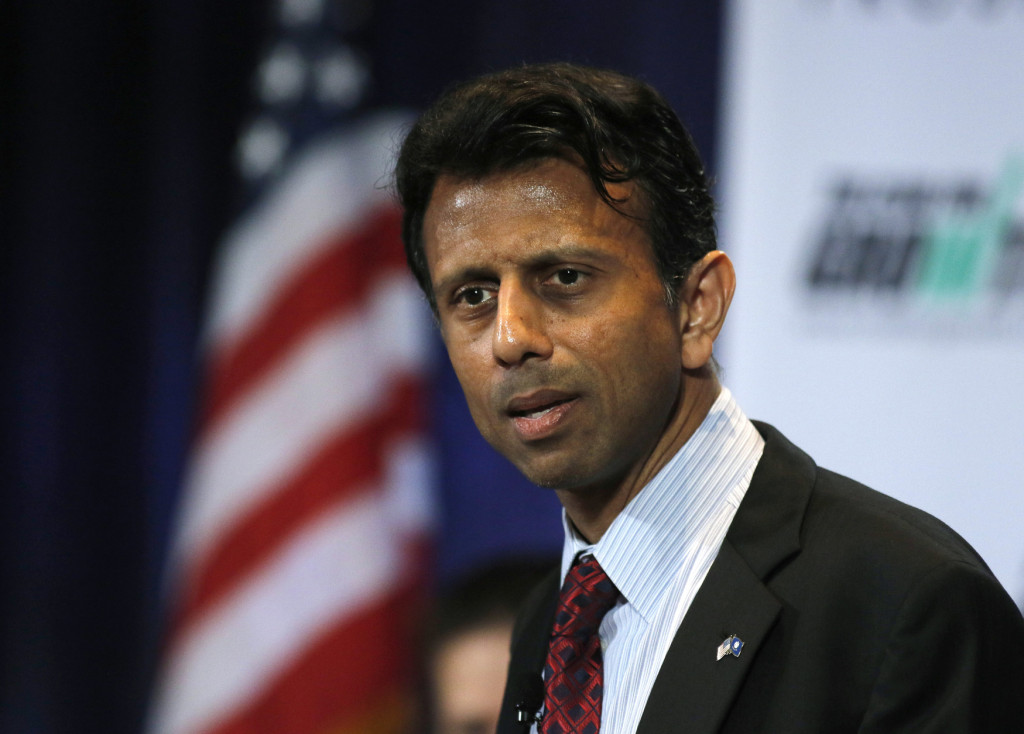
Republican Gov. Bobby Jindal‘s focus on states important in the presidential campaign is drawing lots of criticism at home and doing little apparent good for his 2016 prospects. Lost — at least for now — in a pack of better-known White House contenders, Jindal is taking heat in Louisiana for a $1.6 billion budget shortfall that threatens colleges and health care services with deep cuts. Lawmakers from both parties say his national political ambitions are a distraction. “People, I believe, would love to separate themselves from him,” said Republican state Sen. Robert Adley. Despite frequent travel, his attention to national issues, a good relationship with religious conservatives and plenty of sharp rhetoric against President Barack Obama, Jindal is making little impact in the Republican race. Even so, it’s early in the contest, and the term-limited governor is expected to announce a presidential bid after state lawmakers wrap up their Legislative Session in mid-June. He’s sent political aides to Iowa and recently announced hiring a political operative for New Hampshire. A Catholic convert raised by Hindu parents, Jindal has pivoted from his reputation as a policy wonk to make his religious beliefs the centerpiece of a possible White House campaign. He’s courted evangelical Christians through meetings with pastors and aggressively promoted “religious liberty” in speeches. So far, however, party leaders and key donors have been slow to embrace his national ambitions. And he’s competing for the religious conservative vote against more well-known contenders, like Texas U.S. Sen. Ted Cruz and former Arkansas Gov. Mike Huckabee. “The good news for Governor Jindal is he’s making a good impression with Iowa’s evangelical leaders,” said former Iowa Republican Party chairman Matt Strawn. “The bad news for Governor Jindal is that there’s about a half dozen candidates that are also trying to fish in that pond.” Among Louisiana residents, Jindal’s approval has dipped into the high 20s and low 30s in recent surveys. The governor suggests that’s because “reform is always controversial. Democracy is messy. “But the end result has been a stronger, more prosperous Louisiana for our children,” Jindal told lawmakers last week as the state’s annual Legislative Session began. Yet Jindal’s tax proposals have misfired with lawmakers, who are working on their own budget-balancing ideas in a state where the Legislature traditionally takes its lead on spending plans from the governor. Many South Carolina Republicans who turned out recently to hear Wisconsin Gov. Scott Walker and former Florida Gov. Jeb Bush said they are looking to governors as they decide on a 2016 candidate. Few mentioned Jindal among their top choices. Cary Powell, who works in financial services in Myrtle Beach, likes what Jindal has done in Louisiana and said, “I don’t know why he’s not taking off.” Jindal, said Norm Fay, a Massachusetts native who retired to South Carolina, is a “smart, good conservative.” But, “He can’t win.” Fay explained that he was referring to Jindal’s slight build, his mannerisms and his speaking delivery — all mocked in 2009 when Jindal delivered the GOP response to Obama’s first address to Congress. Matt Mackowiak, a Texas-based Republican strategist, said the Louisiana governor has time to gain traction. “I wouldn’t call it hopeless. The race is still wide open,” he said. But: “Almost everyone in the field is more well-known than he is. Is it an uphill battle? Yes.” Mackowiak said Jindal needs to make more visits to Iowa after Louisiana’s Legislature wraps up its work in two months. More frequent trips, though, risk exacerbating tensions back home. Jindal has been away from Louisiana 45 of the first 100 days of this year, according to an Associated Press tally. His absenteeism is so frequent it sparked an April Fool’s joke from Republican state Sen. Dan Claitor, who tweeted April 1: “Bobby spotted at the Capitol. (April Fool).” Overseas travel has also raised eyebrows. He drew widespread criticism for a London speech in which he repeated heavily disputed claims that Muslims have established “no-go zones” in European neighborhoods that operate outside of local civic control. Even Republicans running to succeed him as governor have picked up on the perception that Jindal has governed Louisiana as if it’s a platform for the White House. One candidate, Republican Sen. David Vitter, said if elected governor, “I’m not going to worry about what national political groups think.” Republished with permission of The Associated Press.


